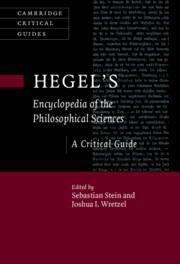Book contents
- Hegel’s Encyclopedia of the Philosophical Sciences
- Cambridge Critical Guides
- Hegel’s Encyclopedia of the Philosophical Sciences
- Copyright page
- Contents
- Contributors
- Introduction
- Chapter 1 Logical and Natural Life
- Chapter 2 Hegel’s Encyclopedia as the Science of Freedom
- Chapter 3 Essence in Hegel’s Encyclopedia and Science of Logic
- Chapter 4 The Concept’s Freedom
- Chapter 5 From Logic to Nature
- Chapter 6 Hegel’s Philosophy of Nature
- Chapter 7 Hegel’s Anthropology
- Chapter 8 Hegel’s Critique of Materialism
- Chapter 9 Hegel’s Psychology
- Chapter 10 Political Ontology and Rational Syllogistic in Hegel’s Objective Spirit
- Chapter 11 Taking the System Seriously
- Chapter 12 §§556–63: Art as a Form of Absolute Spirit
- Chapter 13 The Stubbornness of Nature in Art
- Chapter 14 The Encyclopedia’s Notion of Religion
- Chapter 15 Absolute Geist or Self-Loving God?
- Bibliography
- Index
- Cambridge Critical Guides
Chapter 6 - Hegel’s Philosophy of Nature
The Expansion of Particularity as the Filling of Space and Time
Published online by Cambridge University Press: 07 August 2021
- Hegel’s Encyclopedia of the Philosophical Sciences
- Cambridge Critical Guides
- Hegel’s Encyclopedia of the Philosophical Sciences
- Copyright page
- Contents
- Contributors
- Introduction
- Chapter 1 Logical and Natural Life
- Chapter 2 Hegel’s Encyclopedia as the Science of Freedom
- Chapter 3 Essence in Hegel’s Encyclopedia and Science of Logic
- Chapter 4 The Concept’s Freedom
- Chapter 5 From Logic to Nature
- Chapter 6 Hegel’s Philosophy of Nature
- Chapter 7 Hegel’s Anthropology
- Chapter 8 Hegel’s Critique of Materialism
- Chapter 9 Hegel’s Psychology
- Chapter 10 Political Ontology and Rational Syllogistic in Hegel’s Objective Spirit
- Chapter 11 Taking the System Seriously
- Chapter 12 §§556–63: Art as a Form of Absolute Spirit
- Chapter 13 The Stubbornness of Nature in Art
- Chapter 14 The Encyclopedia’s Notion of Religion
- Chapter 15 Absolute Geist or Self-Loving God?
- Bibliography
- Index
- Cambridge Critical Guides
Summary
Hegel’s Philosophy of Nature is interesting for three primary reasons: (1) its theory of space and time; (2) its theory of physical mechanics; and (3) reconstruction of biological categories. With respect to (1), the primary interest is its connection (a) to intuition and thus to Kant and prior theories of space and time; and (b) to the mathematical categories of the Science of Logic. With respect to (2), the primary interest is (a) the relation to important predecessors, particularly Leibniz and Newton, and (b) the relevance of Hegel’s comments on mechanical explanation for contemporary practice. With respect to (3), the primary interest is (a) the relation of Hegel’s account to past conceptions of organism in Leibniz and Aristotle and (b) the tenability of Hegel’s theory in the light of contemporary biology and Deleuze’s criticisms of the Aristotelian and Hegelian theories of organic life. A further question on the relation of mechanical and organicist explanation is whether the relation between the two supports Kreines’s influential reading of Hegel’s metaphysics as distinguishing between two orders of explanation and therefore of phenomena and dependence relations.
- Type
- Chapter
- Information
- Hegel's Encyclopedia of the Philosophical SciencesA Critical Guide, pp. 109 - 126Publisher: Cambridge University PressPrint publication year: 2021
- 1
- Cited by

